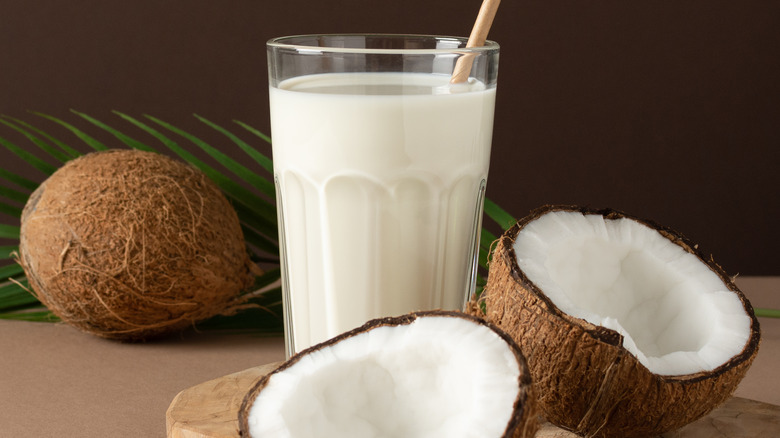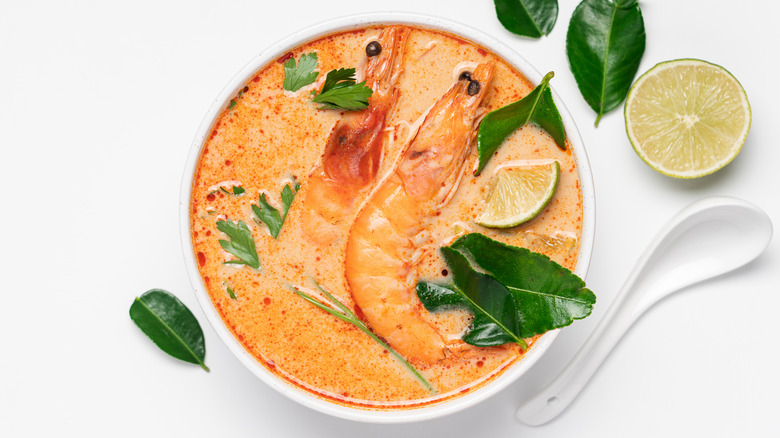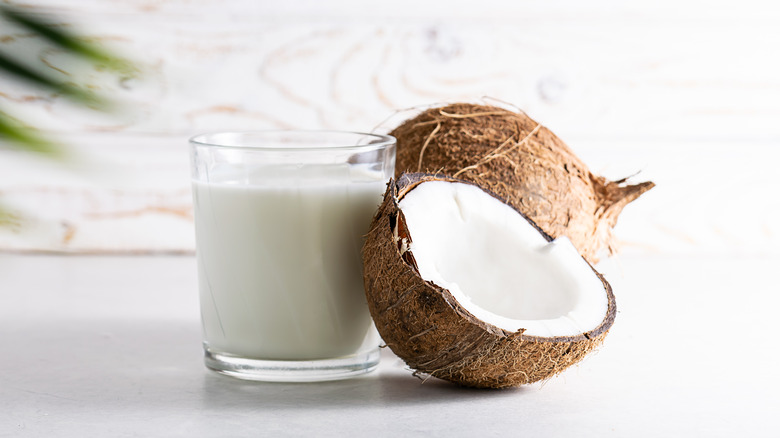Why You Should Always Have Coconut Milk In Your Pantry
Unless you were a coconut fan, you probably wouldn't know that the coconut that gives up the water that quenches our thirst is the same fruit that produces the milk we use in our coffee and to thicken and flavor curries throughout the world.
But unlike coconut water, which comes from young versions of the fruit — and which have plenty of water and very little flesh — coconut milk is made with mature coconuts, which are brown, hard, and hairy and normally have very little water in them, per Frieda's Inc. According to The Spruce Eats, coconut milk is made by cracking the older nuts in half, scraping the white flesh out, then adding water to that mix before blitzing all that in a blender and "milking" the nut by straining it through a layer or two of cheesecloth. While coconut milk in a can certainly has its advantages, there is something to be said about preparing coconut milk from scratch.
Coconut milk can even be made from its fattier sibling, coconut cream. Coconuts & Kettlebells recommends you mix a 1/4 cup of coconut cream with a 1/2 cup of warm water to make coconut milk. This ratio of 1 part coconut cream to 2 parts warm water will be your guide, should you need to bump up your quantities.
But what do you do with the milk once you have it in your pantry?
Coconut milk adds dimension to soups and sauces
Coconut milk can be used in place of regular dairy milk in dishes like casseroles and soups. But if you really want coconut milk to shine as part of an appetizer or main course, the ingredient is best paired with a savory dish — when the end result is a curry, with bits of meat, seafood, or vegetable submerged within its velvety depths. Coconut milk and curry work well together because as Martha Stewart points out, coconut milk counters the spiciness of curry while thickening the curry's texture.
Serious Eats also weighs in; the outlet suggests making coconut milk part of a dip made with red curry paste, lime juice, soy sauce, ginger, honey, and fish sauce, which it says will make for a memorable condiment to enjoy dumplings with. The key's the coconut milk, though, as it again serves as a balance to the dip's curry paste.
It's a lactose-free alternative for drinks and desserts
It may not occur to you to keep coconut milk on hand to use in desserts, but the Auguste Escoffier School of Culinary Arts points out coconut milk is one of the best ingredients to use in a dessert, particularly if you're looking for a dairy substitute that's thick and creamy. Like the ingredient you might've been looking to replace, coconut milk comes packed not just with protein, but with vitamin C, folate, and iron.
And while its flavor may not be for everyone, coconut milk has a gentle flavor that tantalizes the taste buds, which can, per Escoffier, be played up or down, depending on the chef. And if you have doubts about the ingredient's ability to go from savory to sweet, all it takes is a bit of sugar to make this ingredient a key player in dessert prep, per Martha Stewart.
Coconut milk can be a go-to ingredient for mixing cocktails, too. Recall that piña coladas are built on coconut milk (or a coconut alternative like coconut water or cream), with rum, frozen pineapple and white rum. And if you're looking to consume a refreshing, non-alcoholic beverage, coconut milk can be swapped out for regular milk in smoothies — making them a warm-weather treat for vegans, too.


